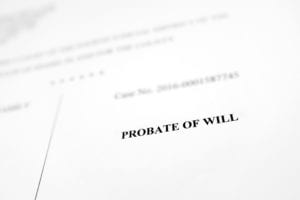What is Probate?
Probate is the legal process that determines how property, assets, and debt are allocated after the passing of a family member. This process is typically initiated by the executor of the estate, who is either designated in the will, appointed by the close family of the deceased or is appointed by the probate court. The executor is responsible for contacting employers, government agencies and financial institutions to notify them of the death. After that, the executor can decide to contact a probate attorney to determine whether the assets left behind are subject to probate and help determine the next steps.
The probate process includes:
- Proving the validity of a will
- Selecting an estate executor if one was not named in the will
- Determining what assets are subject to probate law
- Determining what the assets and property are and how they will be distributed
- Determining how outstanding debts and taxes will be paid
- Identifying all heirs
What assets are subject to probate?
The assets that are subject to probate law is anything that will not pass to a beneficiary by operation of law. Property that is titled in the deceased’s sole name without beneficiary designations, like bank and investment accounts without a beneficiary, vehicles, tenant-in-common real estate, business stakes, etc. are subject to probate law.
Assets that are not subject to probate are typically life insurance proceeds, banks, and retirement accounts with a specified beneficiary and some forms of real estate.

When do I need a probate lawyer?
Because of the complex laws around probate, it is often difficult to determine what assets and debts are subject to probate. If you are not sure which items need to be probated, how they should be distributed, or if you think the items are being distributed unfairly, contact a probate lawyer immediately. Probate laws vary by state and are complex, so it is important to contact an attorney experienced in probate law in your area. Skelton Law offers a free consultation to help you determine whether our services are needed and provide guidance on what steps to take next. We strive to make this difficult process as easy as possible for you and your family.
Estate Planning
If your family member left a detailed estate plan, you might be able to avoid the probate process. They may have put in place systems that bypass probate court, meaning the assets are distributed directly to you and your family.
Planning how your assets will be distributed upon your death will smooth the probate process and potentially help your family avoid it altogether.
Estate planning generally entails:
- Drafting a will and testament
- Designating a guardian for minor children
- Providing a strategic plan for distributing your assets and belongings to your family
- Looking at options such as life insurance or disability insurance to support your family in the event of injury or death
- Minimizing the cost of legal fees, taxes, and other costs
If you need assistance with probate or estate planning in the Everett, Washington area, please reach out to us to schedule a free consultation with one of our experienced probate attorneys. We will walk you through your next steps, and do our best to relieve you of some of the burdens that come with the passing of a loved one.

